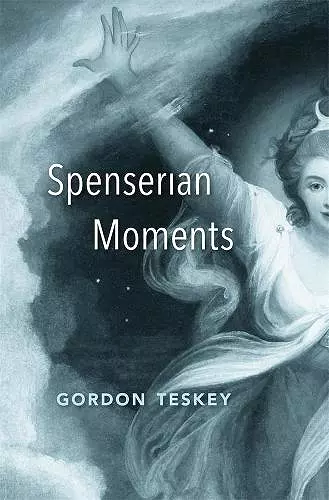Spenserian Moments
Format:Hardback
Publisher:Harvard University Press
Published:31st Jan '20
Currently unavailable, our supplier has not provided us a restock date

From the distinguished literary scholar Gordon Teskey comes an essay collection that restores Spenser to his rightful prominence in Renaissance studies, opening up the epic of The Faerie Queene as a grand, improvisatory project on human nature, and arguing—controversially—that it is Spenser, not Milton, who is the more important and relevant poet for the modern world.
There is more adventure in The Faerie Queene than in any other major English poem. But the epic of Arthurian knights, ladies, and dragons in Faerie Land, beloved by C. S. Lewis, is often regarded as quaint and obscure, and few critics have analyzed the poem as an experiment in open thinking. In this remarkable collection, the renowned literary scholar Gordon Teskey examines the masterwork with care and imagination, explaining the theory of allegory—now and in Edmund Spenser’s Elizabethan age—and illuminating the poem’s improvisatory moments as it embarks upon fairy tale, myth, and enchantment.
Milton, often considered the greatest English poet after Shakespeare, called Spenser his “original.” But Teskey argues that while Milton’s rigid ideology in Paradise Lost has failed the test of time, Spenser’s allegory invites engagement on contemporary terms ranging from power, gender, violence, and virtue ethics, to mobility, the posthuman, and the future of the planet. The Faerie Queene was unfinished when Spenser died in his forties. It is the brilliant work of a poet of youthful energy and philosophical vision who opens up new questions instead of answering old ones. The epic’s grand finale, “The Mutabilitie Cantos,” delivers a vision of human life as dizzyingly turbulent and constantly changing, leaving a future open to everything.
A tour de force and makes what is surely the best case for reading Spenser: that it is his open thinking that matters, not the particular substance of the poem. It will surely set the standard for future readings of Spenser’s work. -- Andrew Hadfield * Times Literary Supplement *
Teskey demonstrates [that] those willing to look past the poem’s daunting reputation and its bristling armature of scholarly impedimenta might discover a lifelong—indeed, life-sustaining—obsession. -- Catherine Nicholson * New York Review of Books *
Refigures the poet as an improvisatory artist whose work is most valuable as a continuous practice of thinking about aesthetic, moral, and philosophical issues…At its best, Spenserian Moments cogently captures the experience of reading the poem for those of us who love it. -- Mark Heberle * Claremont Review of Books *
Teskey has a deep understanding of Spenser’s learning, language, and sense of tradition…Well worth reading. -- Jonathan Locke Hart * Renaissance and Reformation *
Teskey’s is among the strongest of this year’s Spenserian voices…Persuades by elegance and power of statement…There are wonderful things here. -- Joseph Lowenstein * Studies in English Literature *
If any book can restore Spenser to his rightfully prominent place in studies of Renaissance literature—and poetic and philosophical history more broadly—this is the one. Gordon Teskey makes the strongest case in decades for Spenser’s brilliance and importance to both literary history and contemporary theory. The elegance and wit of this book, and the sheer force of intellect on display, will draw in any reader who has the good fortune to open it. -- Melissa E. Sanchez, University of Pennsylvania
Gordon Teskey is among the most consistently surprising and interesting literary critics writing today, about any period or genre, and Spenser has always been at the heart of his concerns. Spenserian Moments will take its place on the shelf of necessary books about the poet’s poet. -- Jeff Dolven, Princeton University
Magisterial…The volume confirms Teskey as the most intellectually bold, expansive, and creative critic of Spenser currently writing…Spenserian Moments conveys less a method of reading than a way of being in the company of Spenser’s poetry that learns from and replicates some of its features as Teskey describes them…My admiration for Teskey’s work does not imply agreement at every turn: his unparalleled talent for concise critical characterization and aphoristic contrast demands and spurs engagement rather than acceptance; his openness to thought provokes open thought. -- Joe Moshenska * Milton Quarterly *
ISBN: 9780674988446
Dimensions: unknown
Weight: unknown
552 pages